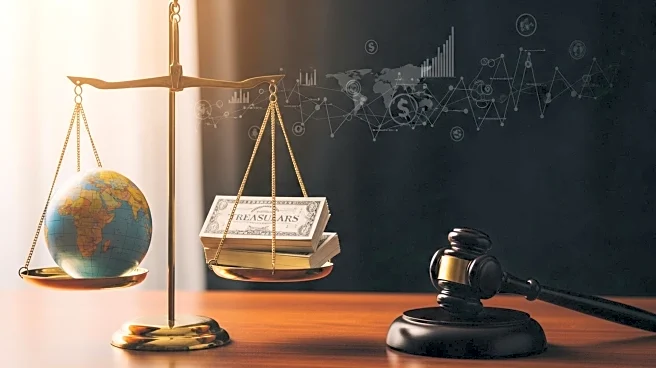What's Happening?
The U.S. Court of Appeals for the Federal Circuit has ruled that most of the tariffs imposed by the Trump administration under the International Emergency Economic Powers Act (IEEPA) are illegal due to a lack of explicit congressional authorization. This decision, which follows a prior ruling by the Court of International Trade, has significant implications for U.S. Treasuries and global markets. Treasury Secretary Scott Bessent has warned that if the Supreme Court affirms this decision, the U.S. may need to refund approximately half of the $180 billion in tariffs collected, potentially straining the Treasury's liquidity. The tariffs were initially projected to generate $5.2 trillion in revenue over a decade, reducing deficits by an estimated $4 trillion. The bond market has reacted to this uncertainty, with the 30-year Treasury yield surging past 4.97% following the ruling.
Why It's Important?
The ruling against the Trump tariffs introduces fiscal risks and market volatility, affecting U.S. Treasuries and global trade dynamics. If the Supreme Court upholds the decision, the U.S. may face significant refund obligations, potentially leading to increased debt issuance and inflationary pressures. This could drive Treasury yields higher, impacting investors and fiscal policy. The legal challenges have also reshaped global trade, with retaliatory measures from key trading partners and disruptions in supply chains. Investors are urged to diversify supply chains and capitalize on emerging markets, while sectors reliant on imported goods face increased risks.
What's Next?
The Trump administration's appeal to the Supreme Court remains a pivotal factor. If the Court upholds the tariffs, the administration may continue its aggressive trade stance. If the Court sides with the challengers, rapid adjustments in policy and investment strategies will be necessary. Investors should prioritize flexibility, hedging against inflation and geopolitical risks, and exploring opportunities in sectors adapting to trade shifts.
Beyond the Headlines
The legal uncertainty surrounding the tariffs introduces prolonged volatility for businesses and investors. Legal experts caution that litigation over refunds could persist for years, creating uncertainty. The interplay between tariffs and inflation has been nuanced, with tariffs initially expected to drive inflation higher, but year-over-year CPI growth averaging less than 2.5%. The sudden loss of tariff revenue could exacerbate inflationary pressures.










